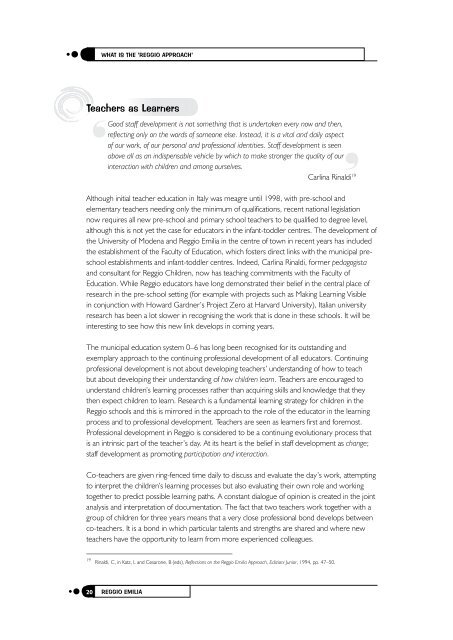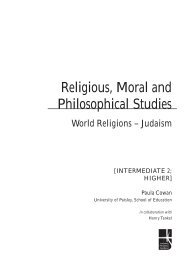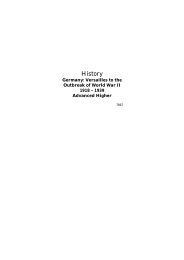The Reggio Emilia Approach to Early Years - Education Scotland
The Reggio Emilia Approach to Early Years - Education Scotland
The Reggio Emilia Approach to Early Years - Education Scotland
You also want an ePaper? Increase the reach of your titles
YUMPU automatically turns print PDFs into web optimized ePapers that Google loves.
Teachers as Learners<br />
0<br />
�<br />
WHAT IS THE ‘REGGIO APPROACH’<br />
Good staff development is not something that is undertaken every now and then,<br />
reflecting only on the words of someone else. Instead, it is a vital and daily aspect<br />
of our work, of our personal and professional identities. Staff development is seen<br />
above all as an indispensable vehicle by which <strong>to</strong> make stronger the quality of our<br />
interaction with children and among ourselves.<br />
Carlina Rinaldi19 Although initial teacher education in Italy was meagre until 1998, with pre-school and<br />
elementary teachers needing only the minimum of qualifications, recent national legislation<br />
now requires all new pre-school and primary school teachers <strong>to</strong> be qualified <strong>to</strong> degree level,<br />
although this is not yet the case for educa<strong>to</strong>rs in the infant-<strong>to</strong>ddler centres. <strong>The</strong> development of<br />
the University of Modena and <strong>Reggio</strong> <strong>Emilia</strong> in the centre of <strong>to</strong>wn in recent years has included<br />
the establishment of the Faculty of <strong>Education</strong>, which fosters direct links with the municipal preschool<br />
establishments and infant-<strong>to</strong>ddler centres. Indeed, Carlina Rinaldi, former pedagogista<br />
and consultant for <strong>Reggio</strong> Children, now has teaching commitments with the Faculty of<br />
<strong>Education</strong>. While <strong>Reggio</strong> educa<strong>to</strong>rs have long demonstrated their belief in the central place of<br />
research in the pre-school setting (for example with projects such as Making Learning Visible<br />
in conjunction with Howard Gardner’s Project Zero at Harvard University), Italian university<br />
research has been a lot slower in recognising the work that is done in these schools. It will be<br />
interesting <strong>to</strong> see how this new link develops in coming years.<br />
<strong>The</strong> municipal education system 0–6 has long been recognised for its outstanding and<br />
exemplary approach <strong>to</strong> the continuing professional development of all educa<strong>to</strong>rs. Continuing<br />
professional development is not about developing teachers’ understanding of how <strong>to</strong> teach<br />
but about developing their understanding of how children learn. Teachers are encouraged <strong>to</strong><br />
understand children’s learning processes rather than acquiring skills and knowledge that they<br />
then expect children <strong>to</strong> learn. Research is a fundamental learning strategy for children in the<br />
<strong>Reggio</strong> schools and this is mirrored in the approach <strong>to</strong> the role of the educa<strong>to</strong>r in the learning<br />
process and <strong>to</strong> professional development. Teachers are seen as learners first and foremost.<br />
Professional development in <strong>Reggio</strong> is considered <strong>to</strong> be a continuing evolutionary process that<br />
is an intrinsic part of the teacher’s day. At its heart is the belief in staff development as change;<br />
staff development as promoting participation and interaction.<br />
Co-teachers are given ring-fenced time daily <strong>to</strong> discuss and evaluate the day’s work, attempting<br />
<strong>to</strong> interpret the children’s learning processes but also evaluating their own role and working<br />
<strong>to</strong>gether <strong>to</strong> predict possible learning paths. A constant dialogue of opinion is created in the joint<br />
analysis and interpretation of documentation. <strong>The</strong> fact that two teachers work <strong>to</strong>gether with a<br />
group of children for three years means that a very close professional bond develops between<br />
co-teachers. It is a bond in which particular talents and strengths are shared and where new<br />
teachers have the opportunity <strong>to</strong> learn from more experienced colleagues.<br />
19 Rinaldi, C, in Katz, L and Cesarone, B (eds), Reflections on the <strong>Reggio</strong> <strong>Emilia</strong> <strong>Approach</strong>, Edizioni Junior, 1994, pp. 47–50.<br />
REGGIO EMILIA<br />
�

















